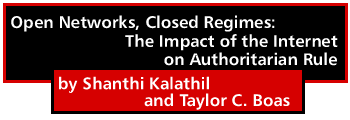
Foreword
As the information revolution rapidly unfolds, Internet use is profoundly affecting governments, corporations, and societies around the world. Many of these effects, while widely assumed to be significant, have yet to be fully explored.
In the absence of thorough analysis, unexamined assumptions about the Internet's likely impact have become conventional wisdom. Tales of wired dissidents toppling strong-armed leaders, along with long-held beliefs about the medium's inherently democratic nature, have lent credibility to the idea that the Internet inexorably undermines authoritarian regimes. Having outlasted the initial euphoria surrounding the information age, this notion has now solidified into a truism. It is an assumption that informs the speeches of politicians, creeps into policy debates, and pops up as fact in press reports.
Few serious studies have yet tested this view. While new research has focused on individual countries or particular types of users, none has looked for patterns of effects across a broad sample of authoritarian regimes, giving equal consideration to Internet use by government, business, and civil society groups.
In this book, Shanthi Kalathil and Taylor C. Boas carefully examine the full range of Internet use under eight authoritarian regimes. They demonstrate how the Internet's net impact on authoritarian rule has often been obscured by conventional wisdom. In China, for instance, the Internet-enabled protests of the Falun Gong must be weighed against the government's efforts to channel online discourse and extend its own authority through Internet use. In Cuba, independent journalists may post their stories on Web servers outside the country, but most citizens are shielded from the global Internet and encouraged to use a national computer network with government-authorized content. In some Southeast Asian countries, globally wired activist networks square off against governments who use the Internet to drive economic development and boost standards of living. And in many parts of the Middle East, the Internet increases access to Western images and ideas but also offers a soapbox for Islamic fundamentalists who oppose broadening civil liberties.
Overall, as Kalathil and Boas note, the Internet is challenging and helping to transform authoritarianism. Yet they also argue that information technology alone is unlikely to bring about its demise. Their study is a valuable corrective to the blind optimism equating the Internet with freedom, and it invites readers to realistically reflect on how the Internet might be better leveraged for democratic aims. This book builds on research conducted over the past three years at the Carnegie Endowment. It will serve as an innovative and useful guide for policy makers, activists, and anyone else who wants to use the potent information tools of the twenty-first century to promote greater global integration and understanding.
Jessica T. Mathews
President
Carnegie Endowment for International PeaceAbout the Authors
Shanthi Kalathil is a Carnegie associate in the Information Revolution and World Politics Project at the Carnegie Endowment. Before joining the Endowment, she was a Hong Kong-based staff reporter for the Asian Wall Street Journal. She has written extensively on the information revolution and political change in developing countries. Ms. Kalathil holds an M.Sc. from the London School of Economics and a B.A. from the University of California, Berkeley.
E-mail: skalathil@ceip.orgTaylor C. Boas is pursuing a Ph.D. in political science at the University of California, Berkeley. He was previously a project associate in the Information Revolution and World Politics Project at the Carnegie Endowment. He holds an M.A. from the University of California, Berkeley, and a B.A. from Stanford University.
E-mail: tboas@uclink.berkeley.eduContext
This text is an excerpt of Open Networks, Closed Regimes: The Impact of the Internet on Authoritarian Rule by Shanthi Kalathil and Taylor C. Boas, to be published in January 2003 by the Carnegie Endowment for International Peace. Reprinted by permission of the Carnegie Endowment for International Peace. © 2003, Carnegie Endowment for International Peace; All Rights Reserved.
This book is available from the Carnegie Endowment for International Peace via Carnegie's distributor, The Brookings Institution Press, and fine bookstores everywhere. To order this book visit www.ceip.org/OpenNetworks or call 1-800-275-1447 or 202-797-6258.


Copyright © 2003, First Monday
"Foreword," In: Open Networks, Closed Regimes: The Impact of the Internet on Authoritarian Rule by Shanthi Kalathil and Taylor C. Boas
First Monday, volume 8, number 1 (January 2003),
URL: http://firstmonday.org/issues/issue8_1/kalathil_foreword.html